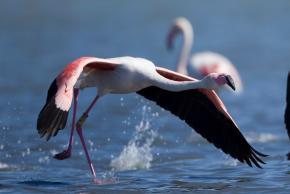Exceptional longevity under surveillance
The result of more than 40 years of monitoring individuals ringed at birth by the Tour du Valat, this extensive study conducted in the Camargue on the greater flamingo (Phoenicopterus roseus), one of the longest-lived bird species in our latitudes (up to 50 years), shows that behavioural decisions, in this case whether or not to migrate, profoundly shape life trajectories. ‘Among flamingos, we observe that migrants pay an initial cost, but then age more slowly,’ explains Hugo Cayuela.
Life choices that are not without consequences
Flamingos that do not migrate, known as residents, have a higher probability of reproducing at the beginning of their adult life. However, these early advantages backfire as they age, as they experience more pronounced senescence (a decline in survival and reproductive performance) at the end of their lives. Conversely, migrants face a higher risk of death early in life, but for those who survive, their decline in reproduction and survival occurs more slowly. Despite these differences in senescence, residents live longer on average than migrants, highlighting the long-term consequences of these life choices.
A major breakthrough in the study of ageing
While the effects of migration on survival and reproduction had been extensively documented, its role in senescence remained largely unknown. ‘What we bring to the table is a perspective on senescence, an angle that has rarely been explored because it requires long-term data to study,’ says Sébastien Roques, co-author of the study. The partially migratory nature of the species has made it possible to observe ‘intraspecific variations’ in ageing.
What next?
This research shows that migration plays an essential role in the life cycle of thousands of species, and ultimately in the life trajectories of animals. However, ‘not everyone can be a flamingo’. For Hugo Cayuela, it is therefore ‘possible that the consequences of migration are not the same for all animal species’, which calls for further research on the subject. Furthermore, this research on birds raises the question of ‘the impact of human decisions to relocate, the consequences of which on ageing remain poorly understood today,’ concludes the researcher.
